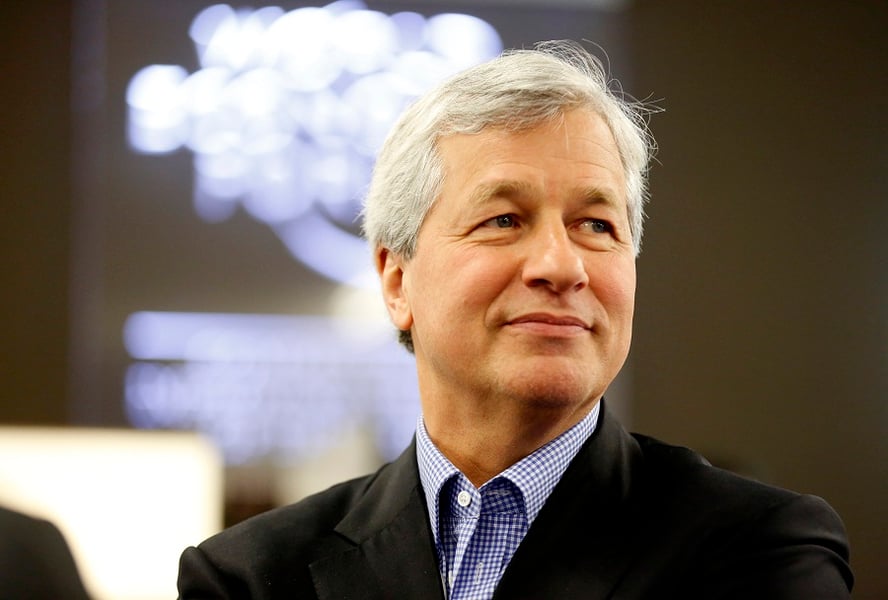

Jamie Dimon’s eyebrow-raising joke about JPMorgan Chase & Co. outlasting China’s Communist Party has so far been met by public silence from officials in Beijing.
But with nearly $20 billion of exposure in the world’s second-largest economy — and big ambitions to expand even further — the U.S. bank has a lot riding on maintaining cordial relations with a government that’s sensitive about anything that might be construed as questioning its legitimacy.
Dimon said Wednesday he regrets making a quip that his bank is likely to outlast China’s Communist Party.
“I regret and should not have made that comment,” Dimon said in a statement from the bank. “I was trying to emphasize the strength and longevity of our company.”
In a sign that JPMorgan is attuned to the risk of blowback, members of the bank’s government relations team and China offices had internal discussions about Dimon’s remarks after he spoke at a panel discussion on Tuesday, according to a person familiar with the matter.
While some executives expressed concern that the joke could be viewed as insensitive, the government relations team told the group that Dimon intended to stress the longevity of JPMorgan’s China business rather than criticize the party. As of midday Wednesday in China, the bank hadn’t communicated with government officials on the issue, the person said, asking not to be identified discussing private information.
When asked for comment at a regular press briefing on Wednesday, Chinese Foreign Ministry Spokesman Zhao Lijian said: “Is it really necessary to cite such remarks that are merely to attract people’s attention?”
Chinese media, often quick to criticize perceived slights against the country by international companies, have yet to cover Dimon’s joke even as they wrote about several of his other comments on cryptocurrencies and U.S. policy risks.
“We hope to be there for a long time,” Dimon said of China while speaking at the Boston College Chief Executives Club. He also relayed the joke he made during a recent visit to Hong Kong: “The Communist Party is celebrating its 100th year. So is JPMorgan. And I’ll make you a bet we last longer.”
One of the few posts about the comment on Weibo, China’s Twitter-like social media platform, came from Shen Yi, a lecturer in Fudan University who has more than 1.5 million followers. “This guy is really quite arrogant,” Shen wrote. He later added: “Looks like JPMorgan doesn’t want its newly acquired license.”
Earlier this year, JPMorgan became the first Wall Street firm to gain full ownership of a securities venture in China. The bank’s total exposure to the country stood at $19.7 billion as of September, mainly from lending and deposits, trading and investing, according to a regulatory filing. While that’s still tiny relative to JPMorgan’s nearly $3.8 trillion balance sheet, Dimon has called China one of the world’s biggest opportunities.
| JPMorgan in China: |
|---|
| Fully owns JPMorgan Securities (China) Ltd. |
| Fully owns JPMorgan Futures Co. |
| Seeking full ownership of China International Fund Management Co. |
| Investing $410 million in China Merchants Bank’s wealth management arm |
| JPMorgan Chase Bank (China) Co. operates eight branches with 61.3 billion yuan in assets by end 2020 |
The market also comes with plenty of risk. China has a history of taking action against companies and individuals that appear to slight the government or challenge its policies, particularly on sensitive issues including Taiwan, which Dimon also referenced on Tuesday.
In 2019, UBS Group came under pressure to fire its chief economist, Paul Donovan, after he made a comment about a “Chinese pig” in a note about rising consumer prices. He later apologized, saying it was “innocently intended.”
China’s financial markets are a big lure for the world’s biggest banks, with billions of potential profits on the line in investment banking and wealth management. Wall Street firms are ramping up their presence in the country despite elevated U.S.-China tensions and an increasingly opaque regulatory environment as President Xi Jinping cracks down on swathes of the private sector.

From outstanding individuals to innovative organizations, find out who made the final shortlist for top honors at the IN awards, now in its second year.

Cresset's Susie Cranston is expecting an economic recession, but says her $65 billion RIA sees "great opportunity" to keep investing in a down market.

“There’s a big pull to alternative investments right now because of volatility of the stock market,” Kevin Gannon, CEO of Robert A. Stanger & Co., said.

Sellers shift focus: It's not about succession anymore.

Platform being adopted by independent-minded advisors who see insurance as a core pillar of their business.
RIAs face rising regulatory pressure in 2025. Forward-looking firms are responding with embedded technology, not more paperwork.
As inheritances are set to reshape client portfolios and next-gen heirs demand digital-first experiences, firms are retooling their wealth tech stacks and succession models in real time.
